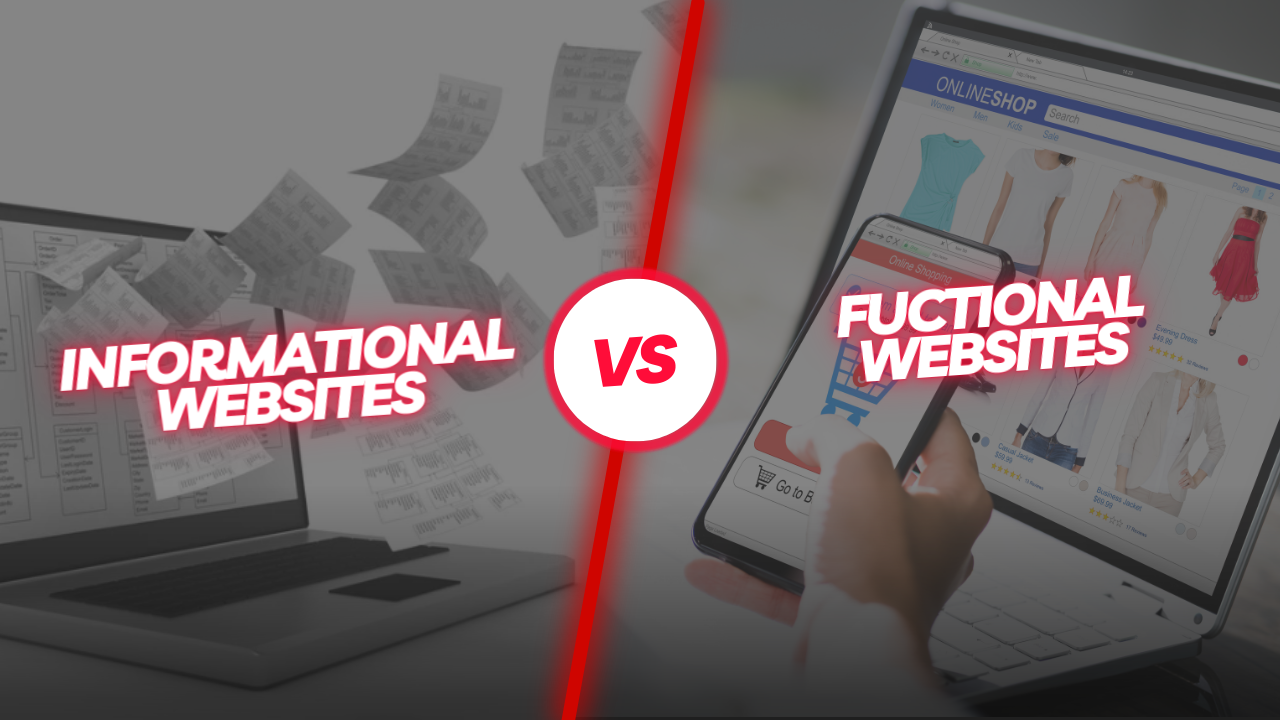
Websites serve various purposes and cater to diverse user needs. Two common categories of websites are informational websites and functional websites. While both types aim to engage users and provide value, they differ significantly in their primary objectives and functionalities. In this article, we will delve into the nuances of informational and functional websites, exploring their distinct characteristics, purposes, and the benefits they offer to businesses and users alike. By understanding these differences, you can make informed decisions when creating or optimizing your website to align with your specific goals.
I. Informational Websites: Your Digital Brochure
Informational websites primarily focus on conveying information, much like a digital brochure. They are designed to provide visitors with valuable content, showcase products or services, and establish credibility for a brand or organization. Key features of informational websites include:
Content-driven Approach: Informational websites prioritize content creation, aiming to educate and inform visitors about specific topics, products, or services. They often include pages such as home, about, services, blog, and contact, delivering comprehensive information to users.
Credibility and Trust: By presenting well-crafted content, testimonials, case studies, and professional design, informational websites establish credibility, build trust, and position the brand as an authority in its respective industry.
Lead Generation: Informational websites incorporate lead capture mechanisms, such as email newsletter subscriptions or contact forms, to gather visitor information and initiate potential customer relationships. They focus on converting visitors into leads by offering valuable resources or enticing calls-to-action.
Search Engine Optimization (SEO): As informational websites rely on organic traffic, they often implement SEO strategies to improve search engine rankings and increase visibility. Optimized content, keyword research, and metadata enhancements play a crucial role in attracting targeted traffic.
II. Functional Websites: Interactive and Transactional Platforms
Functional websites go beyond conveying information; they provide interactive features, user accounts, and transactional capabilities. These websites are designed to enable users to perform specific actions, engage with other users, and facilitate transactions. Here are some examples of functional websites:
Membership and Login Portals: Websites that offer membership or login portals allow users to create accounts, access exclusive content, participate in communities, or engage in personalized experiences. Examples include social networking platforms, online forums, and e-learning platforms.
E-commerce Stores: Functional websites designed for e-commerce focus on product listings, shopping cart functionality, secure payment gateways, and order management systems. These platforms enable users to browse, select, and purchase products or services online.
Booking and Reservation Systems: Websites in the hospitality, travel, and service industries often incorporate booking and reservation systems. Users can check availability, book accommodations, schedule appointments, or reserve services directly through the website.
Web Applications: Functional websites can also encompass web applications that offer specific tools or services. Examples include project management software, customer relationship management (CRM) systems, and online banking platforms.
Benefits of Functional Websites:
Functional websites provide several advantages beyond conveying information. These benefits include:
a) Enhanced User Experience: Functional websites offer interactivity and personalization, enabling users to tailor their experiences and engage more deeply with the website’s features.
b) Streamlined Processes: Websites with functional capabilities simplify tasks and streamline processes for users. Whether it’s making a purchase, scheduling appointments, or accessing personalized content, these websites make actions more convenient and efficient.
c) Monetization Opportunities: Functional websites open avenues for monetization, such as selling products, offering premium memberships, or charging for access to specialized content or services.
d) Data-driven Insights: With functional websites, businesses can gather valuable user data and insights, allowing for
data-driven decision-making. By analyzing user behavior, preferences, and interactions on functional websites, businesses can gain valuable insights to optimize their strategies, improve user experiences, and drive better business outcomes.
e) Increased Customer Engagement and Retention: Functional websites provide opportunities for users to actively participate, connect with other users, and engage in interactive features such as forums, comment sections, or social networking. This engagement fosters a sense of community, strengthens customer relationships, and enhances customer retention.
f) Scalability and Flexibility: Functional websites are designed to adapt and accommodate the evolving needs of businesses and users. They offer scalability to handle increased traffic, user accounts, and transaction volumes. The flexibility of functional websites allows businesses to expand their offerings, introduce new features, and adapt to changing market trends and customer demands.
g) Competitive Edge: In today’s digital landscape, functional websites provide a competitive edge by offering unique features, personalized experiences, and convenient transactional capabilities. By providing a seamless and efficient user experience, businesses can differentiate themselves from competitors and attract and retain more customers.
In conclusion, both informational and functional websites play important roles in the digital landscape, but they serve distinct purposes. Informational websites excel at conveying information, establishing credibility, and generating leads, while functional websites offer interactive features, transactional capabilities, and personalized experiences. By understanding the differences and leveraging the benefits of each type, businesses can create a comprehensive online presence that effectively engages users, builds trust, drives conversions, and fosters long-term success.

Megan Rose
Web & Brand Specialist
The visionary founder and web developer of Brand Whisk, Megan possesses a rare blend of creativity and technical expertise. With an astute understanding of branding, she crafts captivating digital experiences that leave a lasting impact. Megan’s passion for helping businesses thrive through strategic marketing makes her an invaluable asset to any brand seeking to stand out in the digital landscape.
